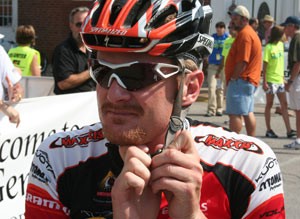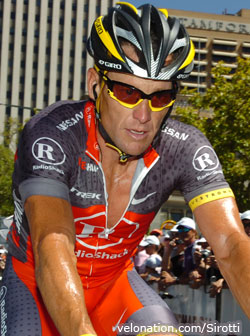 Floyd Landis has admitted to a doping past and accused other high profile cyclists of systematic doping practices. VeloNation recieved an email from a reliable source yesterday that is purportedly between the rider and a high-ranking US cycling official where the American admitted to cheating.
Floyd Landis has admitted to a doping past and accused other high profile cyclists of systematic doping practices. VeloNation recieved an email from a reliable source yesterday that is purportedly between the rider and a high-ranking US cycling official where the American admitted to cheating.
Landis won the overall classification in the Tour de France in 2006, but saw his victory taken away after he was caught doping and consequently suspended for two years. He made his return to the US domestic racing scene last year with OUCH Pro cycling, and moved over to the Bahati Cycling Foundation team in 2010.
The email, which included the addresses of USA Cycling officials, the International Cycling Union (UCI), and a law firm, allege that Armstrong’s longtime friend and manager Johan Bruyneel introduced Landis to doping practices that included testosterone patch use and blood doping.
“I want to clear my conscience,” Landis told ESPN. “I don’t want to be part of the problem anymore.”
“I don’t feel guilty at all about having doped,” he continued. “I did what I did because that’s what we [cyclists] did and it was a choice I had to make after 10 years or 12 years of hard work to get there.
“My choices were, do it and see if I can win, or don’t do it and I tell people I just don’t want to do that, and I decided to do it.”
 The email implicates fellow Americans Armstrong, Levi Leipheimer, George Hincapie and Dave Zabriskie as well as former teammates Michael Barry, Jose Luis Rubiera and Matthew White. Landis also states that he worked with Sports Physiologist Allen Lim, who he claims helped him with the “details and logistics” of doping. Lim is currently working with the RadioShack team.
The email implicates fellow Americans Armstrong, Levi Leipheimer, George Hincapie and Dave Zabriskie as well as former teammates Michael Barry, Jose Luis Rubiera and Matthew White. Landis also states that he worked with Sports Physiologist Allen Lim, who he claims helped him with the “details and logistics” of doping. Lim is currently working with the RadioShack team.
He also claims that BMC Racing’s Andy Riis, John Lelangue and Jim Ochowitz were all aware of his doping practices. The team said in a statement: “The BMC Racing Team is aware of the allegations leveled against some of its management team and one of its riders, U.S. national champion George Hincapie. These allegations are not true, absolutely unfounded and unproven. This is disappointing to anyone who works in the sport or is a fan of the sport.”
Hincapie commented on the matter by saying, “I have been a professional on the circuit for 17 years – which is one of the longest careers in the peloton. During that time, I have earned the respect of my peers and a reputation for working hard, honestly and honorably. I’m really disappointed to hear these accusations.”
Landis also claims that Armstrong worked with Italian doctor Michele Ferrari, who warned him to stop his EPO use because of the new testing procedures and instead use blood transfusions. He alleges that on his way to victory in the Tour de Suisse in May of 2001 Armstrong tested positive for EPO. He claims there was a financial agreement made with then UCI President Hein Verbruggen to keep the positive test quiet. While the email states the year as 2002, Armstrong’s only participation while riding alongside Landis was the previous year.
The WADA released the following statement on the matter:
“WADA is aware of the serious allegations made by Mr Landis. We are very interested in learning more about this matter and we will liaise with the United States Anti-Doping Agency (USADA) and any other authorities with appropriate jurisdiction to get to the heart of the issues raised. WADA looks forward to these further investigations and enquiries by those responsible.
“Generally speaking, WADA encourages everyone with knowledge of banned practices in sport, including athletes who were caught cheating and who denied the evidence for years, to be forthcoming in disclosing the information they may have to the proper authorities. This will further contribute to clean sport and strengthen existing anti-doping programs for the good of clean athletes worldwide.”
UCI President Pat McQuaid also weighed in, telling the New York Times, “I think Landis is in a very sad situation and I feel sorry for the guy because I don’t accept anything he says as true.
“This is a guy who has been condemned in court, who has stood up in court and stated that he never saw any doping in cycling. He’s written a book saying he won the Tour de France clean. Where does that leave his credibility? He has an agenda and is obviously out to seek revenge.”
Armstrong said this before the start of today’s Tour of California stage: “With regards to the specific allegations, the specific claims, they’re not even worth getting into it. I’m not going to waste my time or your time.
“We have nothing to hide. We have nothing to run from. It’s our word against his word,” Armstrong said . “I like our word. We like our credibility.”
The UCI reacted to the Landis statements rejecting his accusations. “The International Cycling Union (UCI) categorically rejects accusations made by Mr Floyd Landis, in particular the allegation that a positive doping result by Lance Armstrong during the 2002 Tour of Switzerland was concealed after an agreement was reached between the American rider, his directeur sportif Mr Johan Bruyneel and the former UCI President, Mr Hein Verbruggen,” the statement read.
“Deeply shocked by the gravity of this statement, which considerably impinges on the honour of all persons who have dedicated themselves to the fight against doping, the UCI wishes to clearly state that it has never changed or concealed a positive test result.”